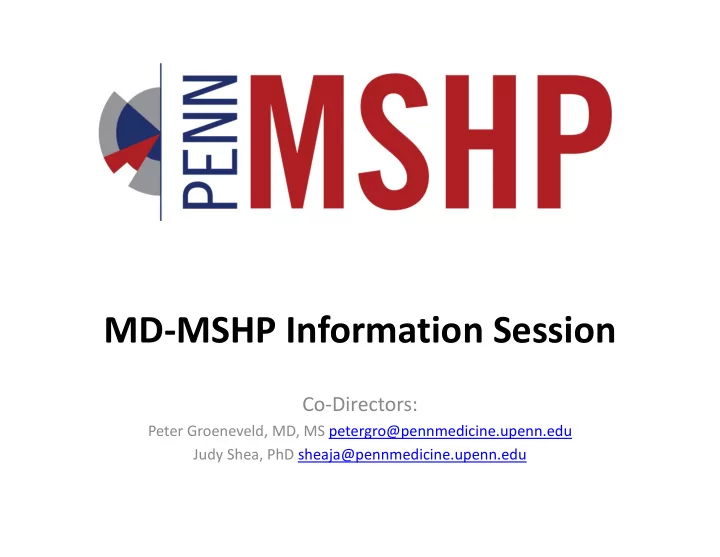

MD‐MSHP Information Session Co‐Directors: Peter Groeneveld, MD, MS petergro@pennmedicine.upenn.edu Judy Shea, PhD sheaja@pennmedicine.upenn.edu
Health Policy Research • Health policy research investigates the organization, management, financing, and delivery of health care and the social forces that shape health in the US and the world
Health Policy Research at Penn is Multidisciplinary and Happens All Over – Leonard Davis Institute of Health Economics – Perelman School of Medicine • DGIM, Emergency Medicine, CHOP, Surgery, Cardiology…just about every clinical Department/Division – The Wharton School – Annenberg – School of Nursing – VA – Many many centers • CHOP PolicyLab, CHIPS, CHERP, CEPACT, CHIBE, Center for Health Outcomes and Policy Research, Penn Medicine Center for Health Care Innovation
Why do MD‐MSHP? • Broaden your career options • Work with the leaders in the field • Benefit from cross‐disciplinary collaborations • Impact the US Health care system in a meaningful way
Objectives • Prepare graduates for health services and health policy research careers in academic, government, community, and health policy • Attract and train future academic and policy clinician leaders
Students • Come from diverse backgrounds – Physicians: cardiology, emergency medicine, family medicine, general internal medicine, heme/onc, immunology, infectious diseases, OB/GYN, neurology, pediatrics, psychiatry, surgery … – Nursing and other post‐docs – Medical students
Same? Different? • MPH – We ask similar questions BUT • We focus on research training • We are a program for clinicians • MSCE – We have similarly rigorous research training BUT • We ask different questions – often about systems • We examine local health care delivery (e.g. single clinic) to national health care delivery (e.g. Medicare policy)
MSHP at‐a‐glance • Started in 2005 • 44 current students • 190+ alumni • 99% graduation rate • Job placement – 72% in research/academic positions – 5% in government – 5% in administration – 6% in health consultancy – 11% in full‐time clinical practice • 25+ affiliated faculty
MD‐MSHP Curriculum • Primary focus on: – Qualitative/quantitative research methods • Primary and secondary data collection, research design, data analysis – Health policy – Health economics – Statistics • Degree requirements: – 7 core courses – 2 elective credits* – Supervised thesis (2 credits) * MS‐MSHP student also earn one credit for MOD320 Health Care Systems in the MD curriculum
MD‐MSHP Study Plan Year Fall Spring Summer Tuition and Billing MD curriculum (Modules MD curriculum (Modules 2, 1 MD Tuition 1,3,6) 3, 6) MD curriculum (Modules 2, 3, MD curriculum (Modules 2 MD curriculum (Modules 4,6) MD Tuition 6) 4,6) Through June: MD curriculum (Module 5) MD Tuition (Fall and Boards 1 Spring) July and August: 3 MD curriculum (Modules 4,6) 1) Intro to Health Policy MD curriculum (Module 5) and Research HPR Tuition (Summer) 2) Economics of Health Care Delivery 6) Methods II: Secondary 3) Methods I: Primary Data Data 4 4) Stats I: Intro to statistics 7) Stats II: Applied Research HPR Tuition 5) Elective #1 Regression 8) Thesis 9) Fundamentals of Health Policy Residency interviewing HPR Tuition (Fall) 10) Thesis 5 11) Elective #2 MD curriculum (Module 5) MD Tuition (Spring) Residency interviewing
MS‐MSHP Program Costs • David A. Asch Medical Student Scholars in Health Services Research Scholarships: – Up to two scholarships available on a competitive basis – Named after Penn faculty member, David A. Asch, MD, MBA, in recognition of his founding role and ongoing impact on the PennMSHP – Each scholarship covers 100% of PennMSHP tuition • Applications due by February 1 of the third year of medical school
Core Courses 1. Introduction to Health Policy and Research 2. Economics of Health Care Delivery 3. Methods I: Primary Data Design and Collection 4. Methods II: Causal Inference Using Secondary Data 5. Stats I: Introduction to Statistics for Health Policy 6. Stats II: Applied Regression Analysis for Health Policy Research 7. Fundamentals of Health Policy
Other Training and Support • Research in progress • Programming and Biostatistics Support • STATA Labs • NVivo Training • Professional Development Series (PDS) • LDI Research and Policy Seminar Series
Mentoring • Mentoring is one of the most important components of our program – Match all students with a primary research mentor – Also get an MSHP mentor – Monitor mentor quality – Build mentorship teams (research, project‐ specific, career) >> organic process
Student Thesis Projects
Student Engagement
Student Engagement
Networking Opportunities • With faculty across Penn’s campus • With alums and peers
What recent alumni say… • “At Penn MSHP’s you learn across the continuum of health services research from policy and population health to implementation science at the bed side. You learn how to become a part of health care transformation, in the context of working directly with leaders it the field. Health policy is only a piece of what MSHP offers.” • “The MSHP program has completely changed my career trajectory. When I began my clinical residency, I hadn’t planned to do research. But this is a really unique program. The opportunity to meet people who want to change the world is really cool. It’s inspiring to hear what people are doing and the more I learn, the more I’m interested in fixing it.” • “Whether or not you have identified that you want a research career, they give you the strategies to get there.”
Learn More • Talk to us • Talk to a fellow or faculty member • Visit a class • Follow us: @Penn_MSHP @pennmshp
Recommend
More recommend